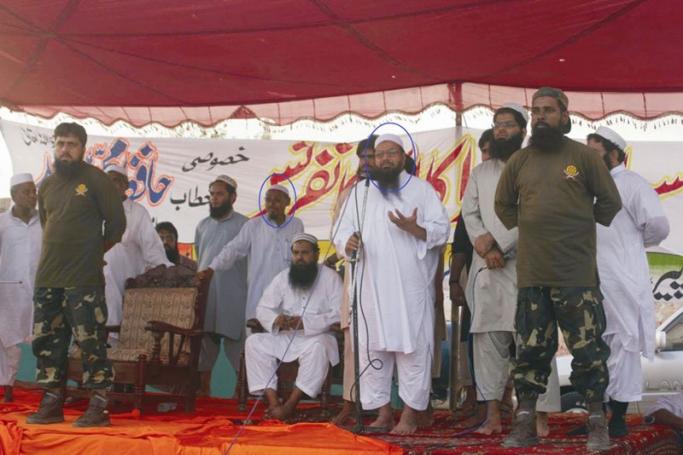Pakistan's Lashkar-e-Taiba (LET) and two of its front groups are active on the Myanmar-Bangladesh border and out to radicalise the Rohingya Muslims to use them for trouble-making in eastern part of the sub-continent, intelligence sources say.
Many Rohingyas have been picked up from relief camps by them and taken to Pakistan for training in use of weapons and sabotage, Western and Indian intelligence sources say.
They told Mizzima that the LET through its front, Jamaat-ud-Dawa (JUD) and Fala-I-Insaniyat Foundation (FIF) , is 'extremely active' among the Rohingyas and other Muslims in Myanmar under cover of relief and rehabilitation.
They say Myanmar, Bangladesh and India's eastern states may all face a 'spurt' in Islamist radical terrorism unless the LET and its fronts were thwarted in good time.
Indian intelligence officials say they have taken the Western warnings 'rather seriously'.
The LET has been operating through the JUD which set up the FIF as a charitable organisation.
FIF functionaries like its vice-chairman Shahid Mehmood and Sindh spokesperson Nadeem Awan have been regularly visiting the Bangladesh-Myanmar border region to assess the condition of the Rohingyas.
"All these recruits are picked up from relief camps. These are Rohingyas who have suffered in riots and are vulnerable to recruitment for terror activities," said a Western intelligence official now on a tour of South Asia to review Islamic radical activities in the region.
He said the LET, of all South Asian Islamist terror groups, have the “widest possible network and the best possible finance" despite being branded a terror group.
LET chief Hafiz Muhammed Sayyid has been making frequent references to the 'atrocities on Rohingya Muslims' during his speeches before Pakistani audiences and calling for revenge.
He has blamed the UN and spoken out against the 'hypocrisy of the West' on the Rohingyaissue.
In July 2012, during the Rakhine state riots in Myanmar, the LET front JUD organised a 'Difa-e-Mussalman Arakan Conference' in Karachi and exhorted its cadres to recruit Rohingyas to avenge the riots.
Sayyid shared the dais during this conference with Maulana Abdus Quddus Burmi, the Harkat-ul-Jihad of Arakans (HUJA),Noor Hussain Arakani of Rohingya Solidarity Organisation (RSO) and Noor al Bashar Arakani, a close associate of Al Qaeda according to a Western intelligence source.
FIF chairman Hafiz Abdur Rauf joined Sayyid on the dias to call for 'revenge in the Arakans.'
Western intelligence agencies are considerably worried because the LET has networks across South and Southeast Asian countries, where large number of Rohingyas have fled to escape trouble back home.
"The LET can easily surface under various covers and operate through local groups they may be funding," the western intelligence official now touring South Asia said.
Indian intelligence says the LET was behind provoking a Muslim backlash against people from the Northeastern region in south Indian cities in 2012 that led to a major exodus of Assamese, Nagas, Manipuris and Mizos from cities like Bangalore and Hyderabad.
They say the LET also used its Indian associates to bomb a Buddhist monastery in Bodh Gaya which is visited by tens of thousands of Myanmar pilgrims.
Bangladesh intelligence has also tightened their vigil on Rohingya refugee camps after reports that Pakistani groups were picking on recruits to radicalise them for violent action in Bangladesh.
Some of the Bangladesh-based terror groups who share close ties with the LET are also active amongst the Rohingyas.
The LET has a lot of clout in Pakistan's military establishment, which is how some of their commanders like Zakiur Rahman Lakhvi, said to be the mastermind of the 2008 Mumbai attacks, walked free.
In fact, LET's effective lobbying with the Pakistan government led to Islamabad sponsoring a resolution in the 29th session of UN Human Rights Council in Geneva on 3rd July this year, expressing 'serious concern' over the plight of the Rohingyas in Myanmar.
The Pakistan-sponsored resolution condemned the systematic gross violations of human rights and abuses committed in Rakhine State, in particular against Rohingya Muslims, called upon the Government of Myanmar to ensure the protection of human rights of the Rohingya Muslims, and requested “the United Nations High Commissioner for Human Rights to present an oral update to the Human Rights Council at its thirtieth session and a report at its thirty-second session, on the human rights violations and abuses against Rohingya Muslims and other minorities in Myanmar, particularly the recent incidents of trafficking and forced displacement of Rohingya Muslims”.
This resolution came at a time when Pakistan is officially seeking to bolster ties with Myanmar,especially military-to-military ties.
You are viewing the old site.
Please update your bookmark to https://eng.mizzima.com.
Mizzima Weekly Magazine Issue...
14 December 2023
Spring Revolution Daily News f...
13 December 2023
New UK Burma sanctions welcome...
13 December 2023
Spring Revolution Daily News f...
12 December 2023
Spring Revolution Daily News f...
11 December 2023
Spring Revolution Daily News f...
08 December 2023
Spring Revolution Daily News f...
07 December 2023
Diaspora journalists increasin...
07 December 2023
Local Shan people call for their identity to be added to signboard












